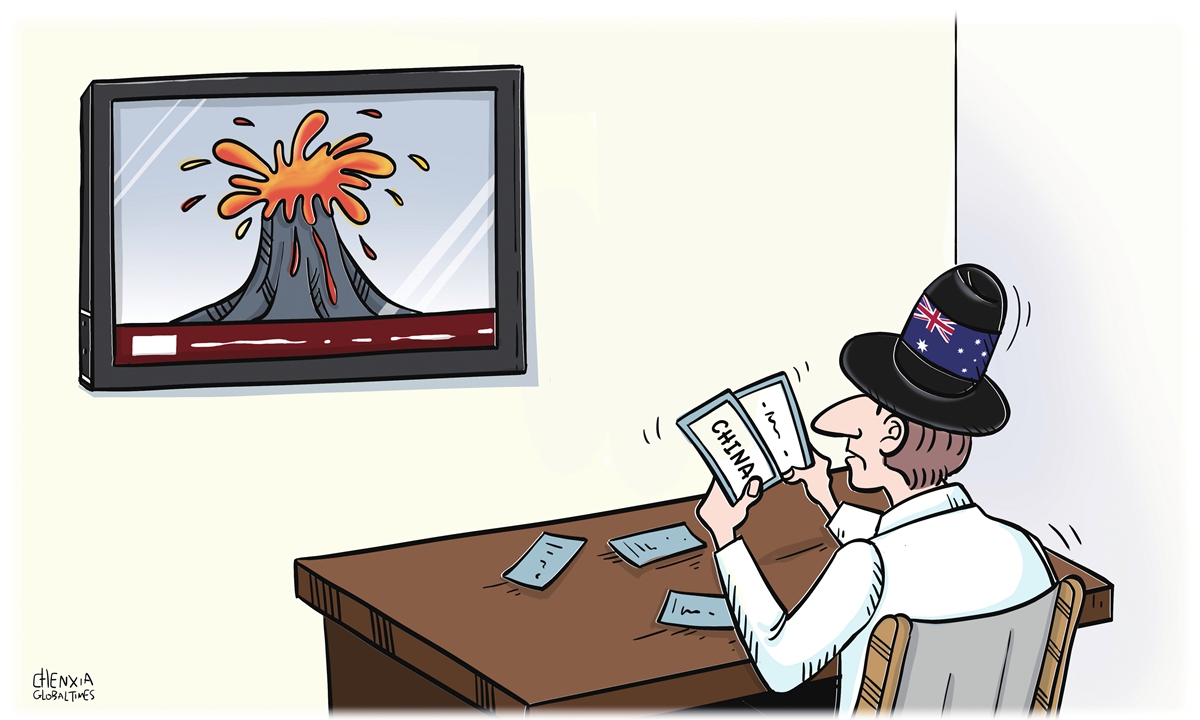Australia’s geopolitical games a twisted way to offer aid to Tonga
Artwork: Chen Xia/GT
The world is now paying close attention to the disasters caused by the massive volcanic eruptions and tsunamis in the Pacific island nation of Tonga. Former Australian Prime Minister Kevin Rudd is no exception. But he tweeted on Wednesday that “Australia must first and foremost help Tonga. Failing that, China will be there in spades.” He then suggested to Australian Foreign Minister Marise Payne to visit Tonga as soon as possible.
With great sympathy, all members of the international community want to help Tonga out of this. However, Rudd’s statement makes him seem flippant: as Tonga suffers from a series of horrific disasters and is in dire need of help, Rudd reminds the Australian government to act before it falls behind China. In other words, it treats humanitarian relief efforts as a competition for geopolitical influence.
Unfortunately, Rudd’s opinion is not an isolated example. He actually represents a type of common voice in Australia that is extremely attentive to China’s movements in the region. For example, a letter from the reader published on The Australian’s website notes that Australia must help Tonga “not only for good humanitarian reasons, but also in the self-interest of national security”. This is to counter China’s growing influence in Tonga.
Canberra considers the Pacific Islands region its backyard. He considers himself the “natural” leader of the region, so he is wary of the activities of non-regional powers. And in recent years, Australia has viewed China’s activities in the region as a threat to its regional influence.
This is related to the fact that China has increased its engagement with Pacific island countries, for example, through the Belt and Road Initiative. As a result, Canberra fears that Beijing is using its growing economic influence to gradually begin to expand its geopolitical influence in the region. Some in Australia even believe that China could establish a military presence there.
In this context, Australia has significantly focused on the Pacific Islands region. He proposed the Pacific Step-up strategy where Canberra assesses the importance of its relationship with Pacific island countries at a strategic level. On the one hand, Australia has increased its economic aid and, on the other hand, it has strengthened its security cooperation with the countries of the region, including the strengthening of the defense against China. So, it’s no surprise Australians like Rudd hold such views – it’s just a geopolitical knee-jerk reaction from some in the country.
Rudd’s tweet may be quite understandable in terms of geopolitics; however, it is entirely inappropriate for him to so naturally mention his geopolitical intentions or goals in the face of natural disasters. Right now, the international community needs to focus on these questions: how much damage has Tonga suffered, what difficulties are they facing and what kind of assistance are they in need of.
Also, all types of efforts to help Tonga are to be commended. Countries should do their best to help the Pacific island nation through its difficulties, rather than using it as an excuse to achieve a political goal. Playing the China card now cannot solve any real problem. This will not only undermine global solidarity in cooperation to help Tonga, but also damage trust and cooperation between China and Australia.
It is commendable that Australia has already sent planes to support Tonga, and Canberra’s “HMAS Adelaide” is also expected to reach Tonga on Friday. However, Rudd’s suggestion of the Australian Foreign Secretary’s visit is quite puzzling. The question is, what practical importance will it have for Payne to visit the country? His visit to Tonga will more likely be a way of showing Canberra’s posture: Australia values Tonga very much and still has influence in the region. As Tonga’s airport was cleared of its ashes on Wednesday, sending its foreign minister to the stricken country certainly shouldn’t be Canberra’s priority.
The author is a research assistant at the China Institute of International Studies. [email protected]


Comments are closed.